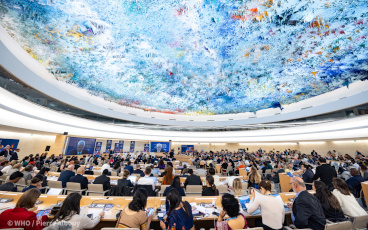Polio vaccination requirements at borders help to stop polio in its tracks
More countries are introducing compulsory polio vaccination requirements for visa applications, following the declaration of polio as a Public Health Emergency of International Concern in May 2014.

1 September
These requirements have been influenced by the Temporary Recommendations made by the Director General of the World Health Organisation (WHO) to initiate a strengthened and well-coordinated international effort to address the high level of transmission so far in 2014.
China, India and Australia have all put measures in place in the last months, joining the ranks of Saudi Arabia, which has required evidence of vaccination from Hajj pilgrims and Umrah performers from endemic and infected countries since 2006. This move will help stop the spread of poliovirus between countries which have extensive travel and trade relationships. The findings of poliovirus from Equatorial Guinea in Brazil in March 2014 reflect the reality of the threat of transmission due to cultural, religious and political movements, as well as geographic proximity.
The requirements put in place by these countries will affect nationals from endemic and infected countries in China, and all visa applicants travelling from these areas as in Australia and India. The most extensive requirements are by India, where one dose of oral polio vaccine (OPV) is required in addition to certification of previous OPV vaccination for resident nationals of infected countries, and for Indian residents travelling from India to specified countries.
Children are often the primary targets of both routine immunization efforts and campaigns to stem outbreaks. However, boosting immunity in all ages is highlighted in the Global Polio Eradication Strategic and Endgame Plan as one of the key strategies to achieve a lasting, polio-free future. This is due to increased evidence that adults play a significant role in the international spread of polio. Documented cases of an adult traveller from Pakistan excreting poliovirus in Australia in 2007 and three cases in Beijing from Xinxiang in 2011 are the most recent of 15% of all importation events between 2004 and 2013 that were associated with long distance travel.
This step by India, China and Australia to prevent the spread of polio by travellers of all ages is therefore not only a huge step forward in meeting the Temporary Recommendations for infected countries, but is also playing a crucial role in the global plan to stop transmission of polio for good by the end of 2014.













